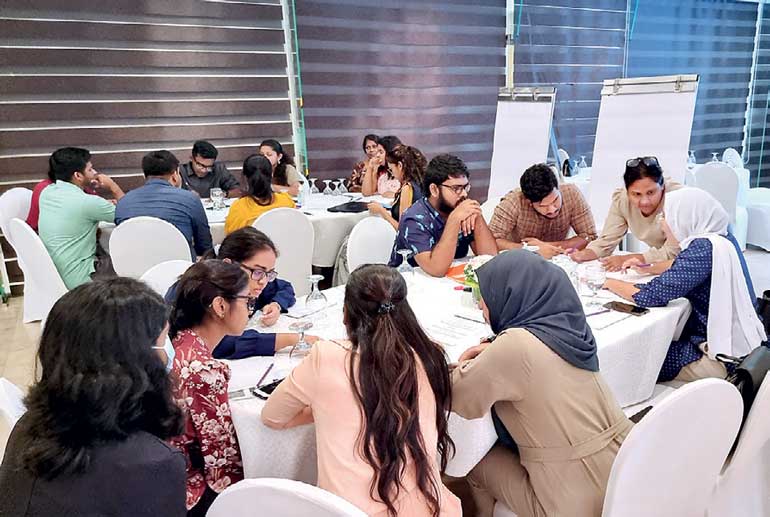Wednesday Feb 18, 2026
Wednesday Feb 18, 2026
Saturday, 28 January 2023 01:18 - - {{hitsCtrl.values.hits}}

Inputs and actions of youth are vital for inclusive and effective climate action and climate policy processes – Pic credit SLYCAN Trust

Youth are key stakeholders and actors for climate action and climate policy processes. On the one hand, they are vulnerable to climate impacts that can affect their wellbeing, education, development, and livelihoods. On the other hand, they can galvanise efforts to address climate change and develop innovative and transformative solutions that connect to local, national, and global processes.
However, to utilise their full potential, youth need platforms and spaces for participation, exchange, and cooperation. Frameworks for youth engagement can help to identify entry points and opportunities for enhancing youth engagement through policy and planning processes as well as concrete interventions, collaboration, and lifestyle changes.
Youth engagement in global climate processes
Under the United Nations Framework Convention for Climate Change (UNFCCC), Action for Climate Empowerment (ACE) is the term that denotes work to empower individuals, communities, and countries to act on climate change. ACE builds on Article 6 of the UNFCCC—which focuses on six key elements of education, training, public awareness, public participation, public access to information, and international cooperation—and Article 12 of the Paris Agreement, which commits to enhancing these areas. In addition, the Glasgow Work Programme on ACE was launched at the global climate change conference in Glasgow in late 2021 to focus on four thematic priority areas (policy coherence; coordinated action; tools and support; monitoring, evaluation, and reporting) relevant to closing gaps and challenges in addressing the six elements of ACE.
Youth engagement is an important aspect of ACE, as young people are seen as key stakeholders in the fight against climate change. The UNFCCC encourages the participation of young people in climate action through various programs and initiatives to promote youth participation in climate negotiations, including a dedicated youth constituency. Gender balance, equity, and social inclusion are additional considerations to ensure that young people, including those from marginalised communities, are represented and have the opportunity to participate in all aspects of the climate change process.
Frameworks for youth engagement
In addition to engagement in global processes, youth contributions to climate action on the national and local level are key to achieving national goals and commitments. A national-level youth framework for climate action can strengthen the enabling environment for youth engagement and build on the six elements of ACE as well as the four priority areas of the Glasgow Work Programme to develop and connect country-specific actions with global goals on climate change mitigation, adaptation, and addressing loss and damage.
At the national level, key priority sectors can be identified in line with the national policy and planning environment. In Sri Lanka, the Nationally Determined Contributions (NDCs) submitted to the UNFCCC identify six priority sectors for mitigation, nine sectors for adaptation, and loss and damage as an additional sector to be addressed. By collecting youth inputs and contributions on these different sectors and aligning them with the elements of ACE, a national-level framework could help to further youth engagement and empowerment for effective and sustained climate action.
Education, training, and youth awareness
One of the key areas identified by youth in Sri Lanka is the provision of opportunities for them to build their capacities, skills, and knowledge. This starts in school education, where climate change could be mainstreamed into curricula and modules or featured in practical activities and voluntary climate action programmes. Creating relevant and accessible learning materials in all three languages could further support climate education, as could access to mentors, technical experts, and knowledge exchange platforms.
In addition, there are many practical skills that are relevant for climate action across different sectors—such as renewable energy, engineering, or agriculture—that could be incorporated into technical and vocational education and training. Training of trainers and capacity development of educators are required to facilitate such a transition towards a holistic approach to raise climate literacy and green skills among youth in the country.
On a broader level, youth-focused campaigns and social media forums could help to raise climate awareness among all youth across the island. Young professionals and volunteers could be identified to contribute to climate awareness campaigns and develop climate stories that focus on the positive and negative experiences of youth in the face of climate change, the impacts that affect them and the actions they have taken.
Access to information and youth participation
While education, training, and awareness creation provide the foundation for meaningful youth engagement, youth also need to access information and spaces that facilitate their concrete participation. Towards this end, platforms and forums can play a key role for youth to organise, network, and co-create projects. Furthermore, youth can provide valuable inputs and perspectives for policy and planning processes and be an active part of implementation and monitoring processes, for example for ecosystem conservation activities.
A national database for effective information-sharing with youth contribution, where the generation of information is conducted through youth-centric processes, could further strengthen the ability of youth to engage in climate action and ensure that the overall narratives on climate change include inputs from all levels and languages. To further scale up youth-led action, either through youth organisations, project teams, research initiatives, or youth entrepreneurship, youth identified the need for support, resources, and incentives, such as certificate courses, seed funding, or loan and grant programs.
International cooperation
Coming back to the opening section of this column, youth engagement on the local and national level takes place in the context of regional and global processes, including the climate negotiations under the UNFCCC. Furthermore, it is important to identify links between the national and global level to create integrated systems and effective strategies for youth to respond to climate change. By enhancing and highlighting opportunities for youth to engage in global climate negotiations, they can build relevant capacities and provide inputs from their own context while also learning from youth around the world. This exchange of knowledge and experiences could then lead to long-term partnerships and engagement in international youth platforms to collaborate, exchange experiences, develop solutions, and access funding and support.
Developing a framework for youth engagement could help to channel existing efforts and benefit from synergies between actions across different institutions, sectors, and levels. Youth in Sri Lanka and around the world have the motivation, ideas, and innovation to drive ambitious climate action. Supporting them through an environment that facilitates access to the necessary knowledge, skills, resources, funding, and connections can turn these ideas and innovation into concrete action that makes a difference on the ground and contributes to national and international climate policy processes.
(Note: This article builds on inputs provided by Sri Lankan youth during dialogues, consultations, and workshops focused on youth engagement in climate policy and action and the development of a draft framework conducted by SLYCAN Trust, a non-profit think tank, in 2021-2023.)
(The writer works as Director – Research and Knowledge Management at SLYCAN Trust, a non-profit think tank based in Sri Lanka. His work focuses on climate change, adaptation, resilience, ecosystem conservation, just transition, human mobility, and a range of related issues. He holds a Master’s degree in Education from the University of Cologne, Germany and is a regular writer to several international and local media outlets.)